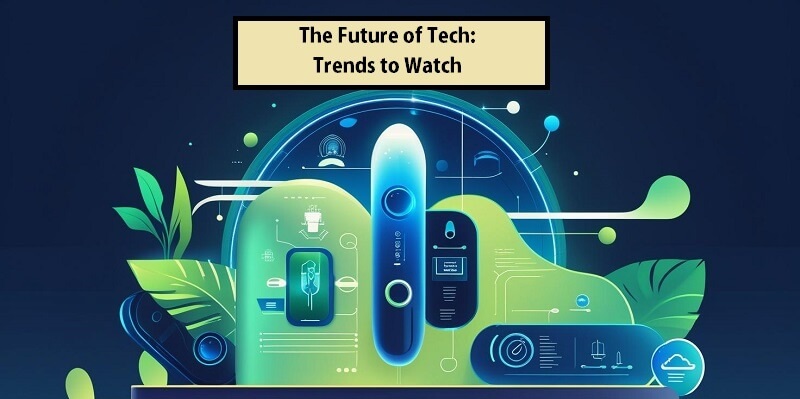Technology has always been a driving force behind human progress. From the invention of the wheel to the rise of artificial intelligence, innovation keeps reshaping the way we live, work, and connect. As we look ahead, the future of tech promises even more dramatic shifts—ones that are poised to redefine industries, societies, and even what it means to be human.
In this blog, we’ll explore the most impactful trends shaping the future of tech and what they might mean for individuals, businesses, and the world at large. Whether you’re a tech enthusiast, a professional looking to stay ahead, or simply curious about what’s coming next, this guide is for you.
1. Artificial Intelligence Becomes Everyday Intelligence
AI is no longer just a buzzword or a sci-fi fantasy. From voice assistants and customer service bots to generative AI tools like ChatGPT, artificial intelligence has made its way into our daily lives. But the future of tech is about more than just clever chatbots.
We’re entering an era of AI democratization—where AI tools become more accessible, more powerful, and more seamlessly integrated into everything from healthcare to finance. Think of AI doctors offering real-time diagnostics, AI teachers personalizing education for every student, or AI-powered legal advisors helping you navigate contracts.
What’s important here isn’t just the technology itself, but how we use it. Ethics, transparency, and inclusivity will become central discussions as AI continues to evolve.
2. Quantum Computing: Solving the Unsolvable
Quantum computing sounds intimidating, but it’s one of the most exciting developments in the future of tech. Unlike traditional computers that use bits (0s and 1s), quantum computers use qubits, which can represent multiple states at once. This opens the door to solving problems that are currently impossible for even the most powerful supercomputers.
Imagine breakthroughs in drug discovery, climate modeling, and encryption happening in minutes instead of years. Tech giants like IBM, Google, and startups like IonQ are racing toward quantum supremacy, and while we’re still in the early days, the impact of quantum computing will be nothing short of revolutionary.
3. Extended Reality (XR): The New Digital Frontier
The metaverse may have lost some of its hype, but the broader concept of extended reality (XR)—which includes virtual reality (VR), augmented reality (AR), and mixed reality (MR)—is very much alive. XR is redefining how we interact with digital content, and its role in the future of tech is only growing.
From virtual offices and immersive gaming to AR navigation and remote surgery, XR is bridging the gap between the physical and digital worlds. Companies like Apple (with the Vision Pro) and Meta are investing heavily in XR ecosystems that could eventually become as common as smartphones.
The key will be user experience: making XR devices more comfortable, affordable, and useful in everyday settings.
4. 5G and Beyond: The Era of Instant Connectivity
If you’ve noticed your phone working faster and smoother in the past year, you can thank 5G. But 5G is just the beginning. It’s laying the groundwork for an ultra-connected world—one where billions of devices communicate in real time, enabling everything from smart cities to autonomous vehicles.
As we move into 6G research and development, expect even faster speeds, lower latency, and more reliable connectivity. This will unlock innovations in telemedicine, real-time translation, remote robotics, and much more.
In the future of tech, speed isn’t just a luxury—it’s a necessity.
5. Sustainable Tech: Innovation With a Conscience
With climate change becoming a global crisis, the future of tech must be green. Fortunately, technology itself can play a huge role in reducing our environmental footprint.
From clean energy innovations like solar and wind advancements to circular economy initiatives (where products are designed to be reused or recycled), sustainability is becoming a core part of tech development.
Tech companies are also investing in carbon removal, low-power chips, and greener data centers. Consumers are becoming more eco-conscious too, pushing for transparent sourcing, minimal e-waste, and ethical production practices.
Sustainable technology isn’t a trend—it’s a responsibility.
6. Cybersecurity in an Age of Digital Everything
As technology evolves, so do the threats. With more of our lives moving online, cybersecurity has become one of the most critical areas in the future of tech.
From ransomware attacks and data breaches to deepfakes and misinformation, the challenges are complex and constantly shifting. Future security solutions will rely on AI to predict and prevent threats, blockchain for data integrity, and new forms of biometric authentication.
But it’s not just about tools—education and digital literacy will be key to keeping individuals and organizations safe in an increasingly connected world.
7. The Rise of BioTech and Human Augmentation
The line between technology and biology is blurring. Advances in biotechnology, genomics, and wearable tech are allowing us to understand and improve the human body like never before.
We’re talking about personalized medicine tailored to your DNA, neural implants that help people with paralysis move again, and wearables that monitor your health in real time.
In the future of tech, our bodies and minds may become enhanced, extended, or even fully integrated with digital systems. It’s a thrilling—and controversial—frontier.
8. Decentralization and Web3: A New Internet Era
The traditional internet is built on centralized platforms that control our data, content, and interactions. But the future of tech might look very different thanks to Web3—a decentralized vision of the web powered by blockchain technology.
Web3 aims to return control to users through decentralized apps (dApps), smart contracts, and community-governed platforms. It’s already making waves in finance (DeFi), art (NFTs), and gaming.
Though it’s still in its early stages—and facing real-world challenges like scalability and regulation—Web3 represents a powerful shift toward ownership, privacy, and transparency.
9. The Evolving Tech Workforce
As tech evolves, so too must the people behind it. The future of tech is changing the way we work—introducing new roles, new skills, and new ways of collaborating.
Remote work, digital nomadism, and AI-driven collaboration tools are creating flexible, global teams. Meanwhile, roles like AI ethicists, data privacy officers, and quantum developers are emerging.
To stay relevant, continuous learning and upskilling will be more important than ever. Education systems and companies alike will need to adapt to prepare the workforce of tomorrow.
10. Humanity at the Center
While it’s easy to get caught up in the coolness of new gadgets and groundbreaking algorithms; the most important aspect of the future of tech is how it serves people.
Technology should be inclusive, equitable, and designed with empathy. This means closing the digital divide, considering accessibility from the start, and making sure innovation lifts up everyone—not just the privileged few.
The tech of the future must prioritize humanity—not replace it.
Also, you can check: Tools to prevent cyberloafing at the workplace.



